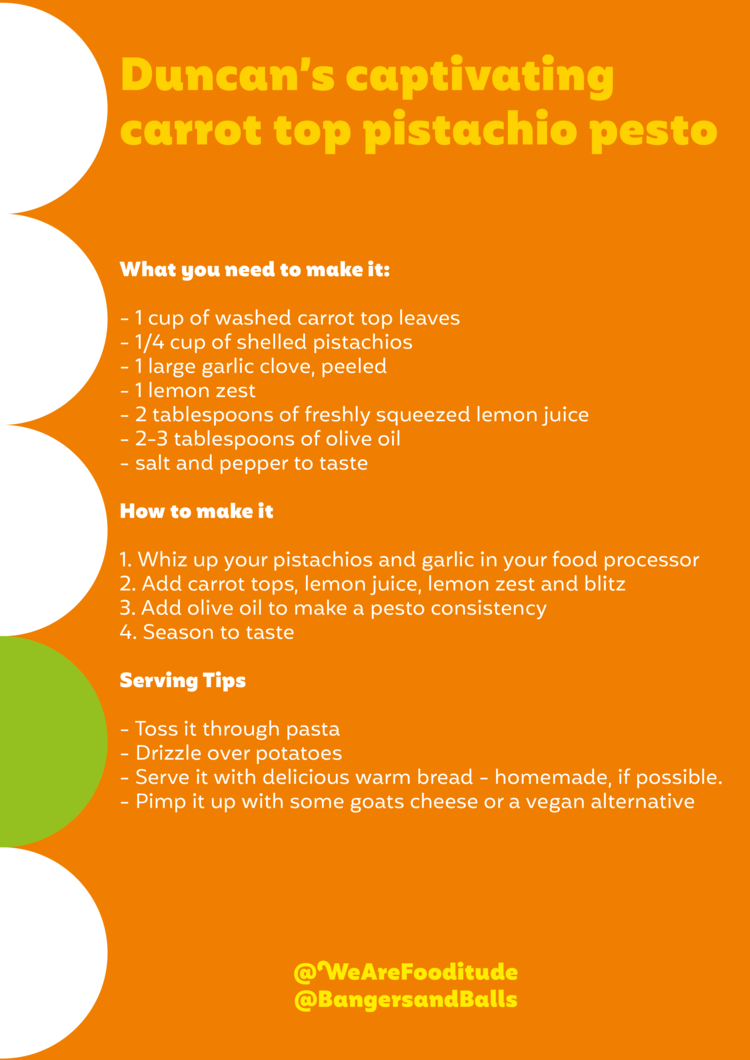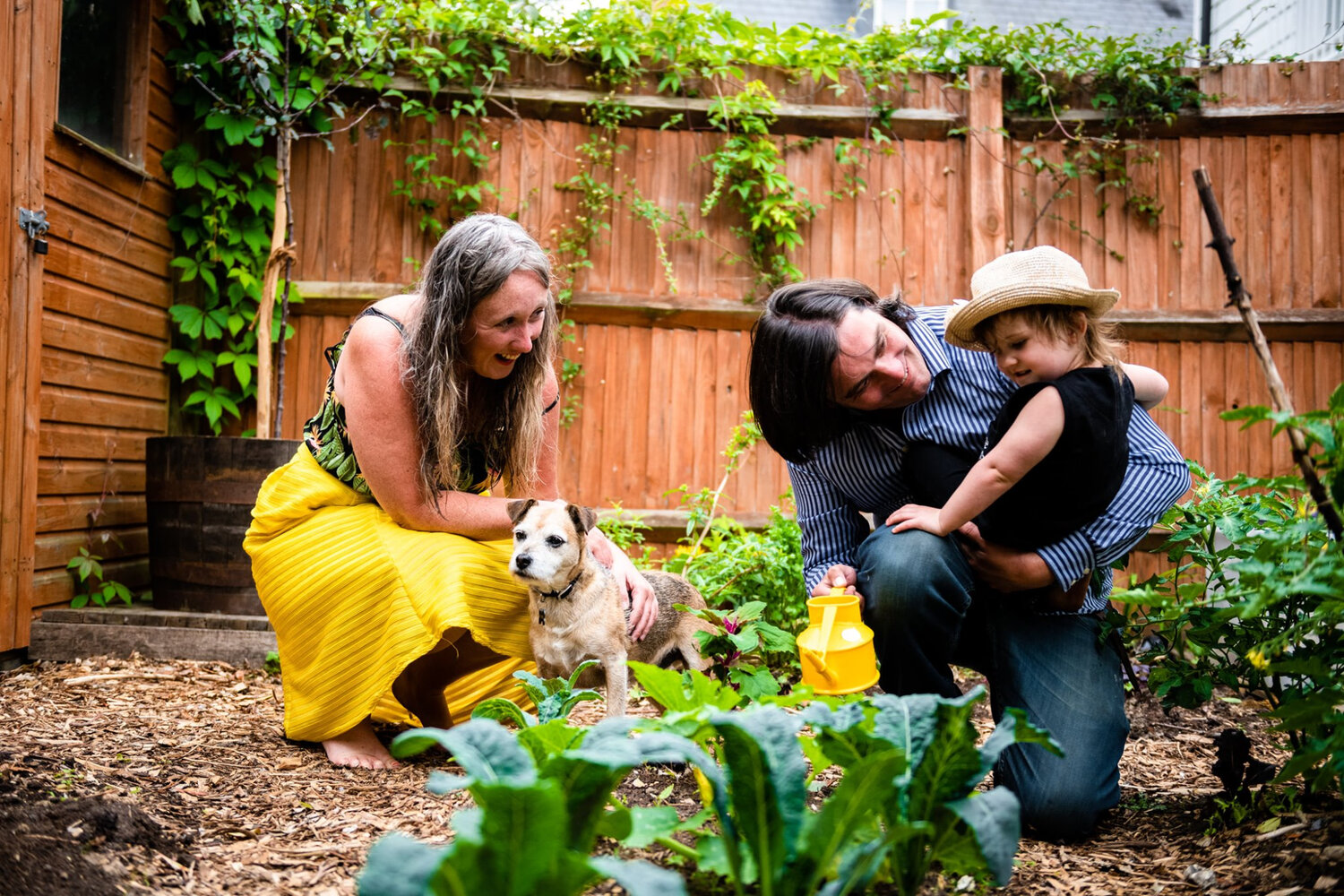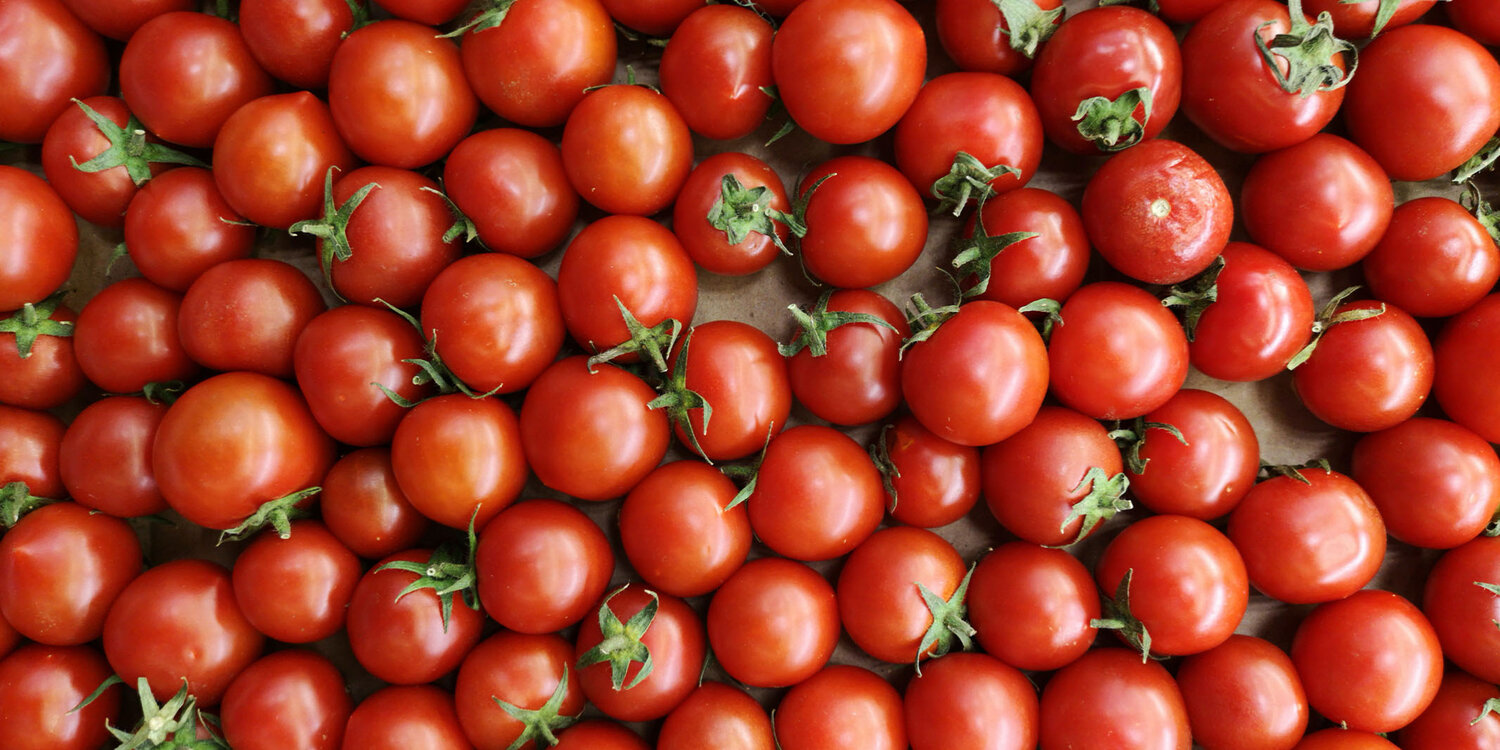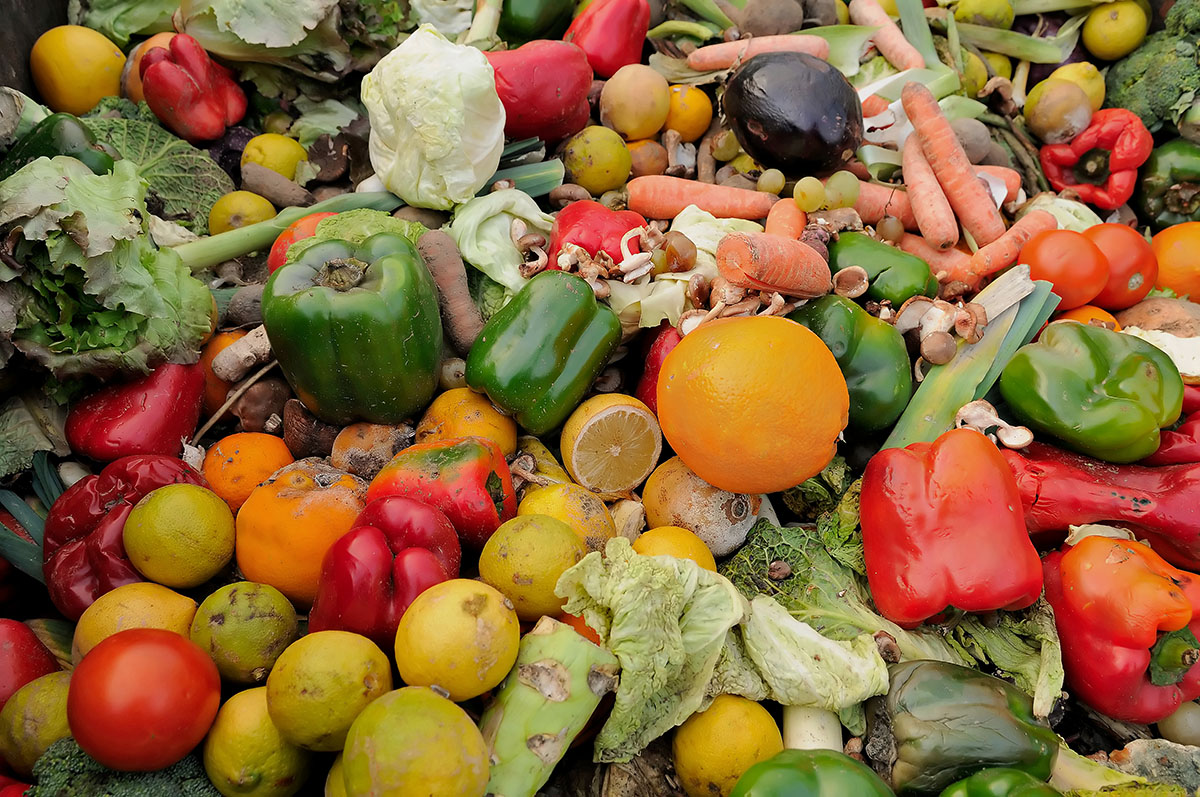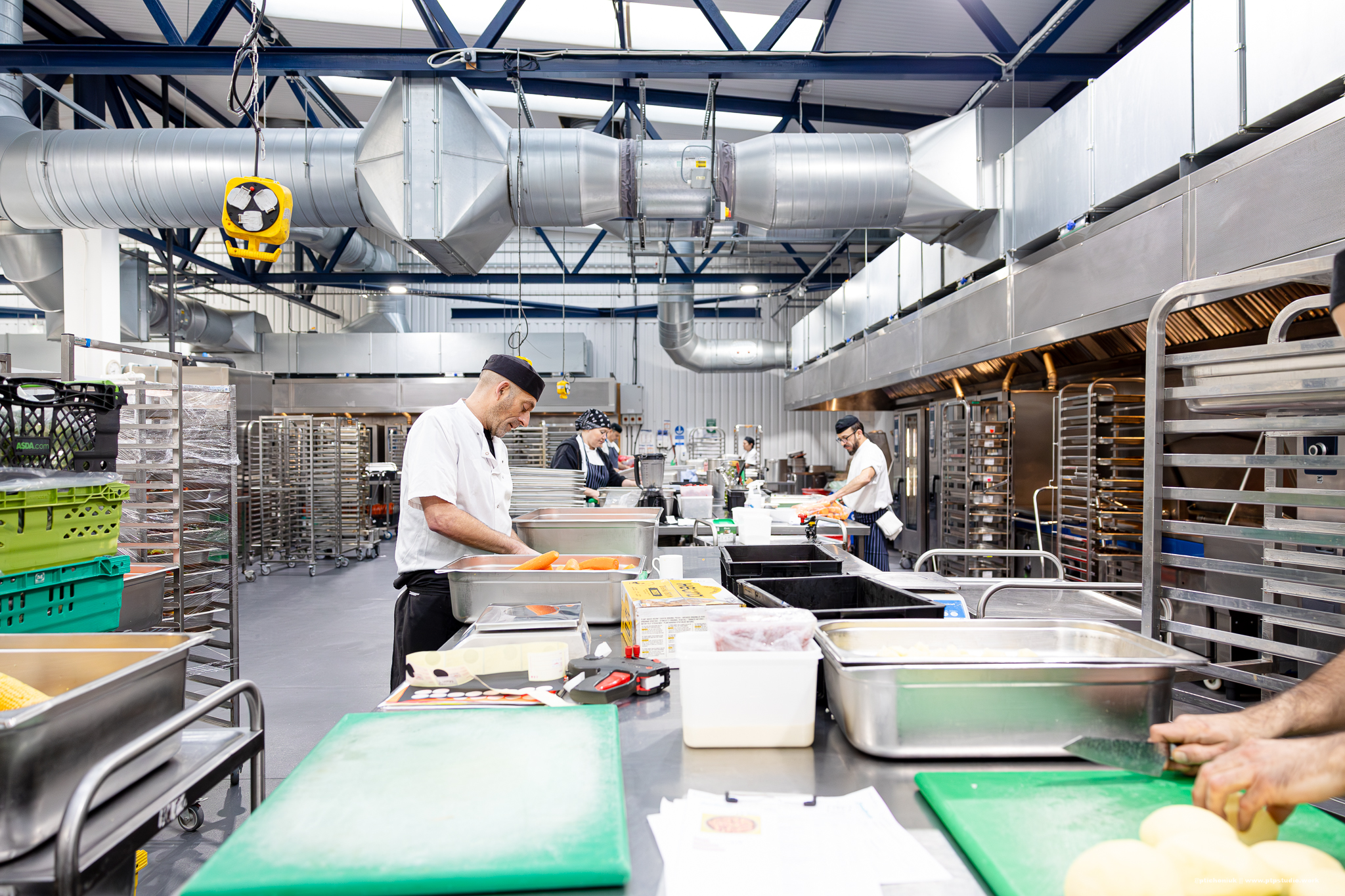I met Imogen Tinkler through a community of food marketers and was instantly taken by her and their family business – Bangers & Balls which she runs with her husband Duncan. Their enthusiasm for farming, foraging, seasonality, local sourcing and zero waste is infectious. For Food Waste Action Week, I wanted to highlight a business with a zero waste ethos. Here’s a rather long, but highly informative transcript of a chat with them.
Tell us a little bit about your business
Bangers and Balls was born in 2017 and started with a mission to put seasonal food at the heart of the British Kitchen Table.
Since then we have been creating recipes with the tips and roots of exciting vegetables, foraged food and nose to tail. We have great ambitions: to show the world you can be happier when you are in tune with the seasons while creating amazing memories and making the world a better place for future generations.
We have a vision to create a successful brand that gives something back and we want to stay strong to our values while working with our diners and revolutionaries. To be the change and write the story together.
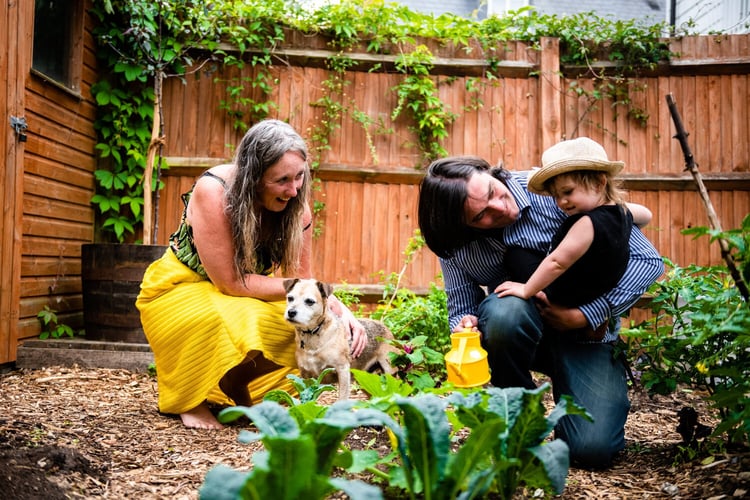
We are not perfect and don’t get everything right but we are honest and that is how we all learn to be the best both in sustainability and with mental health.
What is your approach / philosophy towards food waste?
Food waste sits at the heart of our vision. It is almost zero in the Bangers and Balls kitchen. All our Dining Experiences from Dine at Home to our Supper Clubs like Nose to Tail are booked in advance. This allows us to order the exact amount of produce we need from local growers and suppliers. Any leftover raw ingredients will be either frozen for later use, or preserved or to give our diners a treat.
Potatoes and other root veg don’t tend to get peeled to retain nutrition, flavour and texture, when they do the peel is boiled down into a stock before being composted. If we ever have any leftover prepared food it feeds the family or we drop anything left off to surprise people in the community or our revolutionaries or friends. We all need more acts of random kindness and eating zero waste allows you to do that.
We also use nose to tail butchery, ensuring minimal food waste in the supply chain, and use root to tip cookery where possible with fruit and veg. Like my mouth wateringly good carrot pistachio pesto which is oh so simple and becomes one of the jewels of the dish rather than an extra. Or the Nose to Tail Dining Experience we did at Yew Tree Farm. It was a real treat to work with produce they didn’t include in their organic pig boxes from skin to bone marrow.. It was an amazing honour and experience.
We share our recipes and tips but we are also inspired by the members of free Food Group the Food Hive and our paid membership the Foodie Revolution. It is when we inspire others that we really see that catalyst of change take place.
Have you seen any significant trends / changes in people’s approach to food waste particularly during the pandemic?
The trend towards shopping locally spiked during the pandemic with sales in small independent local stores shooting up by 69%. People have been surprised at what is available, that it is sometimes cheaper not more and that they are able to purchase the quantities needed, minimising waste and packaging. It also increased the community feel on highstreets. There has been an amazing buzz here in Whitstable, Kent.
Time has also changed – we have more time to do the things we value even though it has been hard being separated from friends and loved ones. The nation has taken up crafts and hobbies that they might not have had time for before. This includes some of our favourites like growing, foraging, cooking and preserving. By having a more hands on approach to our food we are all more likely to be mindful about where our food comes from and what is happening to the waste.
We know we have spent more time in the kitchen and garden and we didn’t think that was possible! It has been amazing to share this with people online during the pandemic by making Marmalade Scotch Eggs for VE Day our Christmas Pudding on Stir it up Sunday with the wonderful Arthur Kane. And making sourdough bread with Vicky Feldman from Canterbury Baking School. 70% of us throw bread out every week in the UK. Making it yourself means it doesn’t normally last long enough to have any left. Or you actually do freeze what is left as you don’t want to waste it when you make it! These frozen parts are perfect in making Meatballs.
It has been amazing to watch even more people in their gardens and allotments! Sales of vegetable seeds in the UK now exceed sales of flower seeds for the first time since the Second World War. It was a growing trend as in 2015 sales of “grow your own veg” accounted for almost 80 percent of sales and seeds compared to just 30 percent in the 1990s. But the pandemic has really made it explode.
It really excites me that we will continue to as it directly benefits us. Research By Garden Organic and Sustain in 2015 shows that gardening or tend to plants benefits our mood, self- esteem and other elements of wellbeing. What I found particularly interesting is that wellbeing indicators were not dependent on how long people spent doing it.
Finally I think that having time to pause and take stock of our lives and the world that we live in has given people a new mindset. People have noticed that with fewer aeroplanes in the sky, cars on the road and ships in the sea the airs and seas are clearing up, with fish in the canals of Venice for example. Many people are taking this as an opportunity to reassess the way their way of life impacts the environment around them and are taking steps towards a more sustainable food life.
What in your opinion can be a game changer for reducing food waste in businesses like catering or restaurants?
A business must take a holistic approach to their food waste in order to make significant changes. Only by looking at the entire supply chain from farm to fork can a business discover what the most impactful changes could be.
It is not enough to do everything within your business to reduce waste if your suppliers or customers are apt to waste food excessively. By selecting suppliers that can be trusted to have a sustainable approach to their food waste and encouraging your customers to be more mindful with the food they don’t eat, a business can concentrate on reducing their own waste assured that they are doing everything they can on every level.
Also to keep having the conversation. We are honest in that we don’t get everything right! We have to keep asking the questions! At our first pop up festival event we knew we didn’t want waste from disposable plates and cutlery as we are against it.
Yet if we use plastic plates people are less likely to return them so we decided on a charity shop china plates. Then we started to think China is heavier in a car, is it actually more environmentally friendly than paper plates? We worked out it was if we did it locally but not if we were going further away. Then it would make environmental sense to rent them but not economic sense. It becomes a minefield.
During lockdown when we changed to Dine at Home. We looked at getting cotton bags to go with our hampers but found they needed to be reused thousands of times before they meet the environmental performance of plastic bags! The Denmark Ministry of Environment and Food write “ organic cotton is worse for environmental impact.
According to the report, organic cotton bags have to be reused many more times than convention cotton bags (20,000 versus 7,000 times) based on the assumption that organic cotton has a 30% lower yield rate on average than conventional cotton and therefore we assumed to require 30% more resources, like water to grow the same amount.
So our diners would need to use our canvas bag everyday for almost 55 years to make it the same as using a plastic bag once.
So now we deliver our Supper Clubs in Cardboard boxes that are from our local producers or from the ends at the supermarket. It fits into our zero waste and it does what we want it too even if we don’t have beautiful printed canvas bags!
It can be pretty overwhelming and there are so many factors to consider. . So we had to decide to just be honest. To be honest with our customer. Sometimes we are going to get things wrong. We are thinking about how we can improve and make things better one step at a time from our kitchen table. And if all of us can be as honest as possible then we will all get there a little quicker and be inspired by each other.
What changes can people make in their homes to reduce household food waste?
It is through the micro changes we make at home and in our buying habits that we will really drive change towards reducing household waste. Though it can feel overwhelming and we all go, does this really make a difference? Yes it does! Just by taking the time to think about it we are helping to create change.
One of the biggest changes people can make is to stop buying prepackaged food from the supermarket (don’t get me started on unnecessary single use plastic). The supermarkets dictate the quantities to encourage waste so we buy more.
Instead of buying a packet of six sausages for two people, go to the butcher and buy two. We know this can be hard to do but try just reducing the packaging on two or three things a week. It is amazing to see how quickly it changes once you become aware.
We also still love packaging on things! Why does a donut in a box look even more tempting than one on its own. It makes us value it more. So changing our mindset to how we value things is hard! We definitely don’t always get it right!
I do love taking a hamper with me with my lunch rather than a lunch box for example. It feels so special to open it even though it has taken no extra time. It also makes a quick lunch in a sandwich carton feel like a downgrade vs a deliciously cooked meal from a local supplier or one in the office who has thought about waste and packaging.
It all has to start with how you and your business value it. As an extra? Or at the heartbeat of the brand.
Smaller, but longer term changes you can make at home to change mindset about food:
Grow some of your own food even if it's herbs on your window sill
This will give you a new appreciation of the food and what goes into it. Our little girl is three and it is a pure joy to watch her check to see if the strawberries are ripe. Also her horror after waiting for her strawberry to be beautiful and plump to find a small animal has taken a huge bite. This shows her what happens to produce and will help her build the picture of what it looks like for farmers on a larger scale. It also creates lovely family memories.
It really has taught us alot to watch the world through a toddler. I laughed so much as she tried to uproot a tomato plant. She was quite cross with it as it hadn’t borne the fruit she had expected yet. We had planted it the day before! She felt it would be better in another spot. She later explained that in Peppa Pig when they water the veg patch it all grows “very instantly”. Learning this is not how it works and patience and care is needed is a hard lesson for a three year old. And often us as an adult.
Eating Seasonally is a huge thing people can do
It can be hard from January to March to eat the seasons as we are in the “Hunger Gap” but it can also be a pure joy if you have preserved and saved for the season.
It is a bit like a past you is giving the future you a present. Eating the seasons reduces waste due to packaging and air miles and also gives you more variety to your food. You start eating rather than just consuming.
Get involved in food communities
We have a membership group called the Foodie Revolution where we all preserve one thing a week from Marmalade to Rhubarb Hot Sauce to Elderflower Wine. We also grow together. We are all human and we have the best intention to be motivated but it can dip with all of us. When you are part of something it makes it that much easier. You could do it with your family, your friends, join a local group or of course come and say hi to us.
Known for their delicious supper clubs, we couldn’t let Duncan go without sharing a zero waste recipe. Here is his captivating carrot top pesto
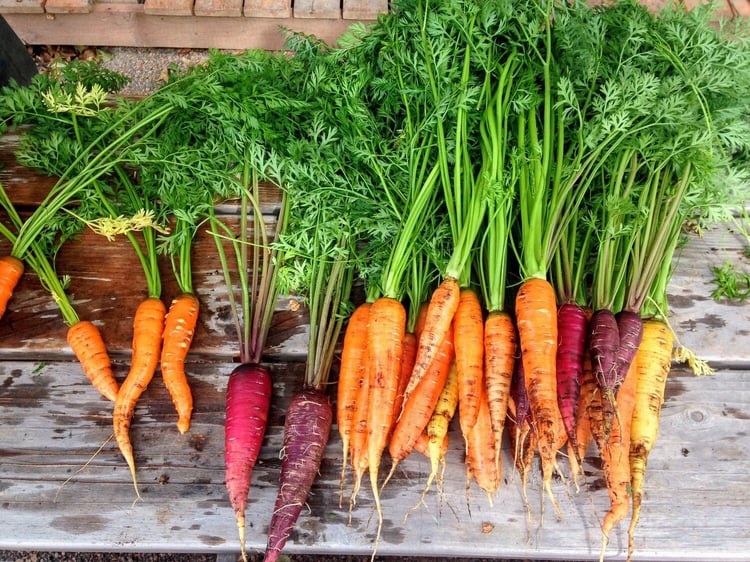
Straight from the farm to the kitchen table is the Captivating Carrot Top. This may come as a surprise but the green tops on your carrots are edible! They have a sweet earthy flavour, that is reminiscent of well – carrots. So don’t throw them on the compost but let us tingle your taste buds with Duncan Tinklers dashingly delectable Carrot Top Pistachio Pesto.
Ok, so they look great – but how do they taste?
Carrot top greens look like parsley in appearance, texture and versatility, except carrot top greens actually taste like carrots!
Our Five Favourite things about Carrot Tops
● They are a great to add into stock – they give it a golden hue
● They are highly nutritive, rich in protein, minerals and vitamins. They contain 6 times the vitamin C of the root and are a great source of potassium and calcium.
● The Victorians used carrot tops to dye things yellow
● They are delicious, cheap and available all year round
● Zero waste – you get to eat the whole carrot
Duncan was inspired by his love of root to stalk cooking. Supermarket bagged carrots with the tips chopped off don’t offer you the option of this beautiful green top. Unless you pay a lot more and they still come in plastic! Which is why we love our weekly organic delivery from Jack’s Veg. Here’s a recipe for the pesto.
Try the recipe and share your pics with us on @WeAreFooditude and @bangersandballs. or even head over to their
